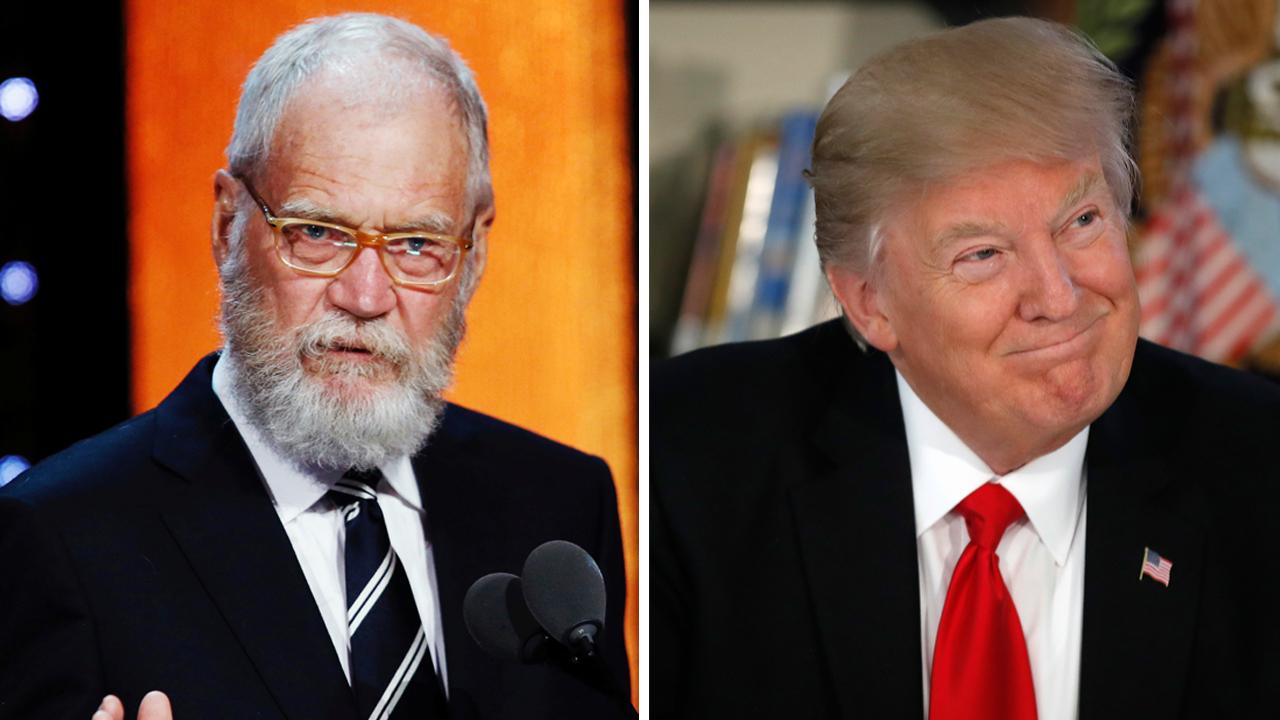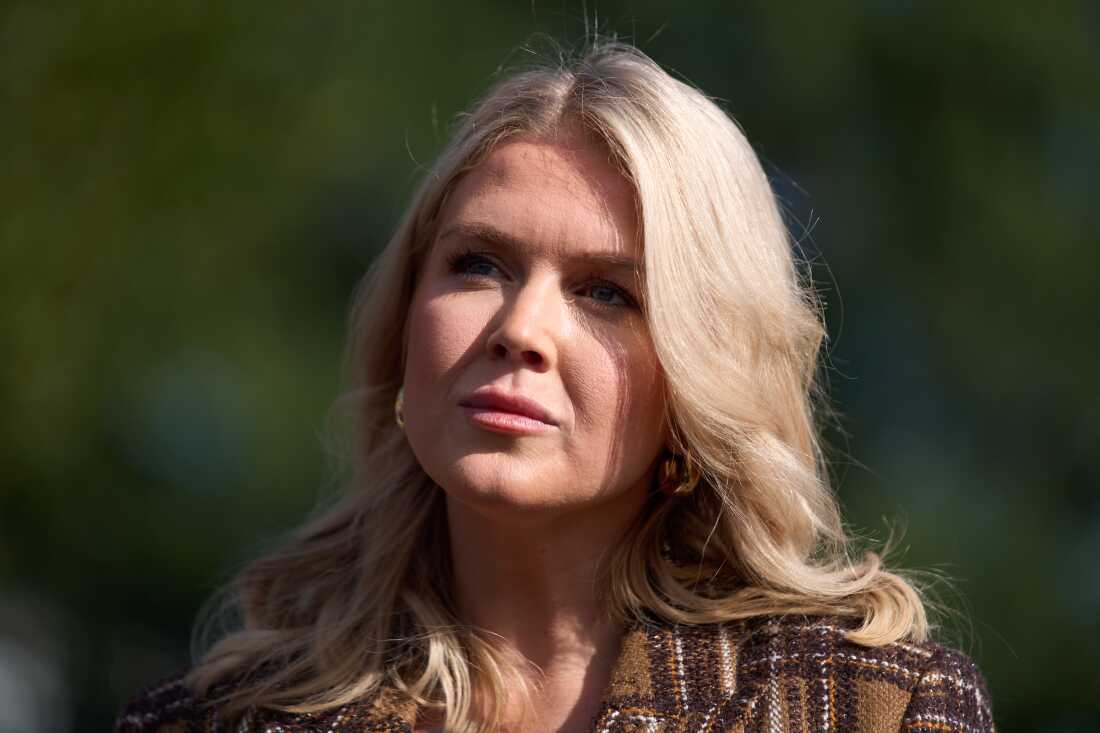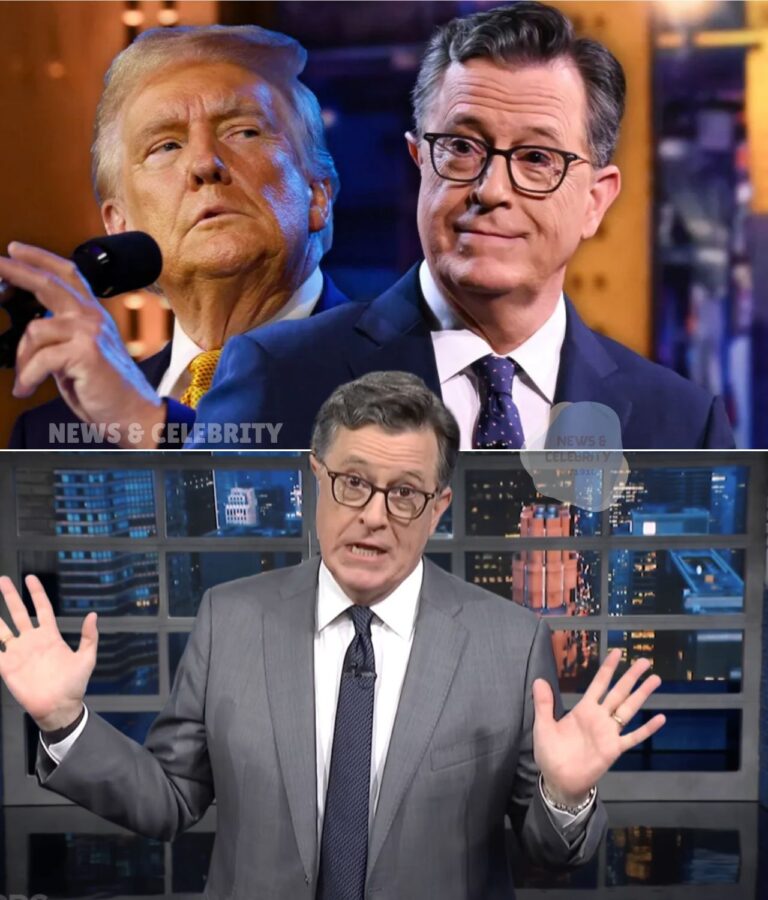In a jaw-dropping live television moment that shocked audiences worldwide, former President Donald Trump was removed from the stage during an interview on David Letterman’s Late Show, turning what was meant to be a casual chat into a historic confrontation. The unexpected eruption of tension unfolded quickly, as the evening’s lighthearted atmosphere gave way to sharp accusations and heated exchanges, culminating in security intervention and Trump’s dramatic exit.

From the outset, the encounter appeared to be a typical late-night interview, peppered with humor and promotional banter regarding Trump’s new book, “The Art of the Comeback.” As he took the stage, the crowd erupted in applause, with Trump basking in the aura of his own celebrity, flashing his trademark grin and addressing Letterman with a perfunctory familiarity. However, as the conversation progressed, it became glaringly clear that this segment was veering off-script.

Letterman quickly shifted gears, prompting Trump about the contents of his new book, but it was not long before the atmosphere soured; jokes became jabs as Trump made a controversial claim regarding his business empire. “I started with a small loan from my father,” he declared, waving his hand dismissively. That statement ignited a firestorm, with Letterman countering, “Donald, that’s more money than most families will ever see. You really think that’s small?”
As stunned silence enveloped the studio audience, the tension escalated dramatically. The interview, which started with surface-level pleasantries, delved into Trump’s controversial business practices and the financial realities faced by small businesses he contracted. With accusations of unpaid debts levied against Trump by Letterman, the atmosphere grew increasingly charged. Trump’s composure began to crumble as his signature bravado was met with piercing scrutiny. “That’s absolutely false. I pay everyone what they deserve,” Trump asserted, though the mounting evidence from numerous small contractors painted an altogether different picture.

The turning point came as Letterman, unyielding, probed deeper, questioning Trump about his business dealings and the fallout they triggered. The crowd held its breath as Letterman challenged, “So, when a small company does a job for you and you settle for less than you owe, that’s just business?” The stakes soared, and Trump’s patience snapped. “You don’t know what you’re talking about, Dave. You’ve never built anything in your life,” he shot back, his bravado morphing into hostility.
The tension was so palpable that one could almost feel it in the air. Letterman, cooler than ever, responded with a chilling calmness, acknowledging that while Trump may build skyscrapers, he has constructed something more valuable—trust. The audience gasped collectively, as disbelief washed over their faces, realizing they were witnessing not just an interview but a confrontation of ideals.
Then, the ambiance shifted into disturbed territory. Trump’s face flushed with anger as he exclaimed, “I don’t need this. You ambushed me!” To which Letterman responded with an air of resignation, asserting, “You can walk out, Donald. But remember, the truth doesn’t walk out with you.”

As Trump’s deafening indignation echoed through the studio, security personnel, sensing the situation’s volatility, positioned themselves at the edge of the set. The Brooklyn-born talk show host remained firm, looking an exasperated Trump straight in the eye, “Maybe they just sense the meltdown coming.” The audience held their breaths once more, caught in the jaws of a moment that no one expected to unfold.
In one swift motion, as Trump ripped off his microphone, he stormed towards the exit, shouting that he would not tolerate such treatment. With his departure, the live broadcast continued, the audience still reeling from what transpired. Viewers at home witnessed this extraordinary duel—the classic clash of Trump’s relentless bravado against the undeniable weight of accountability, a vivid reminder that not every arena allows for the dominance he often insists upon.
As the cameras turned back to Letterman, who smoothed his tie in composed fashion, he addressed the audience with a tone that suggested a blend of incredulity and amusement, stating, “Well, folks, that’s something you don’t see every day. We’ll be right back.” The immediate aftermath was a mixture of cheers and disbelief, leaving millions captivated by the sheer audacity of what just transpired.
In a world where celebrity and television often intersect, what should have been another promotional platform for Trump had turned into a historic takedown, a rare moment in which a figure accustomed to controlling the narrative was held to account. As audiences across the nation processed the spectacle, the implications echoed far beyond the studio walls—a reminder of the growing scrutiny faced by public figures who often evade honest dialogue about their actions.
Post-interview analyses began flooding social media and news outlets, erupting into discussions about accountability, media roles, and the ethics of celebrity culture. The clash resonated with viewers of all political backgrounds, inadvertently posing a complex question about the nature of power, truth, and representation in a media landscape where triumph often clouded the realities at stake.
Tonight, as the dust settles on this groundbreaking exchange, one thing is clear: the landscape of political discourse in America is shifting. The layered power dynamics of celebrity culture vs. accountability captured in this very moment had the potential to alter the trajectory of how figures like Trump engage with media in the future. As audiences assess the fallout, this confrontation lingered in the minds of viewers long after the credits rolled, setting a new precedent in the steadfast world of late-night talk shows.
What began as a routine interview rapidly transformed into a confrontation for the ages, leaving the public and critics questioning the durability of the shield that celebrity affords. Ultimately, Trump’s dismissal did not just represent his departure from a mere set; it signified a moment in television history that spoke to critical societal truths and the boundaries of fame—a moment where accountability seized the spotlight on a platform typically dominated by charisma alone, revealing the complexities of real-world implications behind the glitz of political celebrity.





